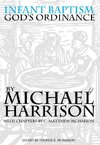C. Matthew McMahon
Christian Preacher
[video=vimeo;169014458]https://vimeo.com/169014458[/video]
Michael Harrison (1640-1729) was a faithful Puritan Minister of the Gospel and a powerful Reformed Presbyterian preacher.
Is this just another book on infant baptism? No. It is possibly the best succinct, yet comprehensive work on the subject ever written by a puritan. It was originally a longer series of sermons that Harrison preached to his congregation, many of whom were Baptist at the time. At their request, he placed his thoughts into a concise treatise that covers all the main points needful in understanding the biblical position of infant inclusion in the Covenant of Grace, and infant baptism.
Harrison’s work is so acute in its biblical presentation of the truth of Scripture that the reader cannot be but left in awe of his masterful exactitude to God’s mind on the issue of infant inclusion in the Covenant of Grace, and the application of the sign of the covenant to every visible member in the church. He gives the reader an introductory lesson on the Covenant of Grace and those parties involved by way of its membership, and then proceeds to teach the reader why infants are to be baptized.
Harrison deals hermeneutically with 9 biblical arguments on the issue; two of which are his most important foundational chapters setting the stage for the rest of the book. He also shows the danger of shutting infants out of the kingdom of heaven, and answers all the main objections to Antipaedobaptist theology on the issue. He ends the work with a chapter on the right mode in which baptism should take place, along with a chapter on applying the truths of the study to the life of the members of the covenant community.
Without sounding clichéd, this work is among the top works ever written on the subject, and in my estimation is irrefutable. The unbiased reader will have no issues with Harrison’s biblical exposition and logic driven inference. It is a powerhouse puritan work that every Paedobaptist ought to read for support, and every Antipaedobaptist ought to read to untangle their dispensational theology. Harrison says that Antipaedobaptism is “to be justly abhorred as false doctrine,” and proves this to the reader beyond a reasonable doubt.
This is not a scan or facsimile, has been updated in modern English for easy reading and has an active table of contents for electronic versions.
Get the eBook pack here at the Puritan Shop (ePub, mobi and PDF)
Get the Printed Book Here at Puritan Publications and don't forget to use a coupon!
Get the Kindle Version Here
Get the Nook Version Here
Get the Google Play Version Here

Infant Baptism God’s Ordinance, by Michael Harrison (1640-1729)"This work is a theological canon!" - Scott Bushey
Michael Harrison (1640-1729) was a faithful Puritan Minister of the Gospel and a powerful Reformed Presbyterian preacher.
Is this just another book on infant baptism? No. It is possibly the best succinct, yet comprehensive work on the subject ever written by a puritan. It was originally a longer series of sermons that Harrison preached to his congregation, many of whom were Baptist at the time. At their request, he placed his thoughts into a concise treatise that covers all the main points needful in understanding the biblical position of infant inclusion in the Covenant of Grace, and infant baptism.
Harrison’s work is so acute in its biblical presentation of the truth of Scripture that the reader cannot be but left in awe of his masterful exactitude to God’s mind on the issue of infant inclusion in the Covenant of Grace, and the application of the sign of the covenant to every visible member in the church. He gives the reader an introductory lesson on the Covenant of Grace and those parties involved by way of its membership, and then proceeds to teach the reader why infants are to be baptized.
Harrison deals hermeneutically with 9 biblical arguments on the issue; two of which are his most important foundational chapters setting the stage for the rest of the book. He also shows the danger of shutting infants out of the kingdom of heaven, and answers all the main objections to Antipaedobaptist theology on the issue. He ends the work with a chapter on the right mode in which baptism should take place, along with a chapter on applying the truths of the study to the life of the members of the covenant community.
Without sounding clichéd, this work is among the top works ever written on the subject, and in my estimation is irrefutable. The unbiased reader will have no issues with Harrison’s biblical exposition and logic driven inference. It is a powerhouse puritan work that every Paedobaptist ought to read for support, and every Antipaedobaptist ought to read to untangle their dispensational theology. Harrison says that Antipaedobaptism is “to be justly abhorred as false doctrine,” and proves this to the reader beyond a reasonable doubt.
This is not a scan or facsimile, has been updated in modern English for easy reading and has an active table of contents for electronic versions.
Get the eBook pack here at the Puritan Shop (ePub, mobi and PDF)
Get the Printed Book Here at Puritan Publications and don't forget to use a coupon!
Get the Kindle Version Here
Get the Nook Version Here
Get the Google Play Version Here




